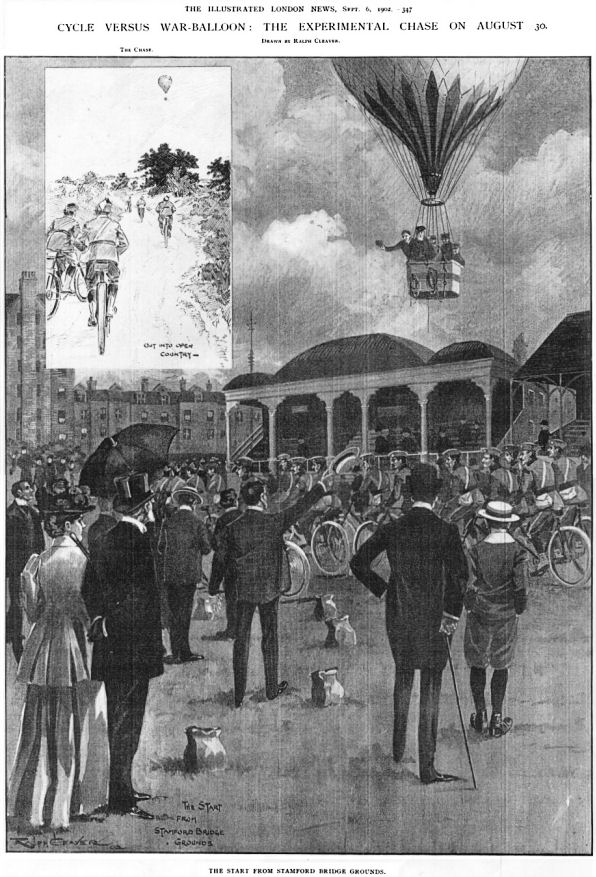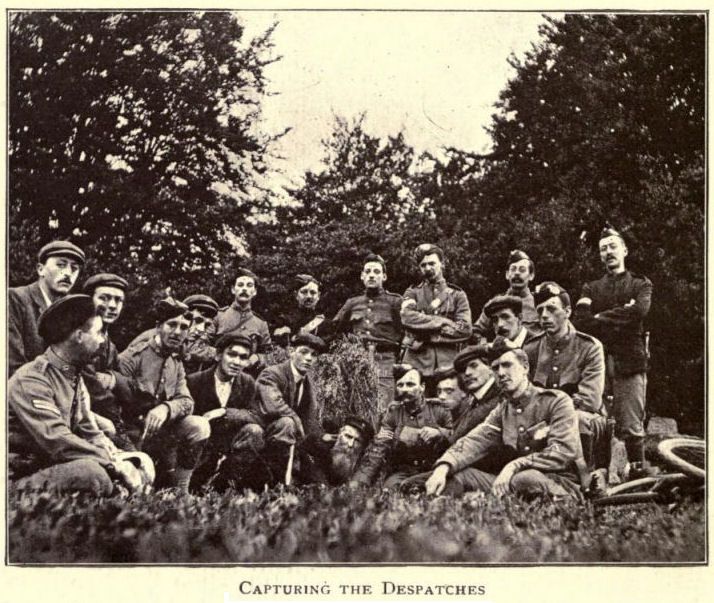The 26th Middlesex was the forerunner of the 25th London Bn. The
following account is an interesting exercise at a stage when military
cycling was establishing its credentials.
Conditions of warfare have
altered tremendously in the course of thirty years, yet the sieges of Ladysmith, Kimberley, and Mafeking could not fail to suggest comparisons with the siege of Paris, and invite speculations as to what chance a free balloon, rising from a
beleaguered city, would have. of escaping from the guns of today, or of a pursuing enemy mounted on cycles or motorcars. Reflection on this point eventually led Bacon to the suggesting of a pretty and instructive little experiment, which was immediately welcomed with popular enthusiasm.
A balloon ascent was arranged from Stamford Bridge, representing for the nonce a besieged town, one August Saturday afternoon ; and, through the Press, a challenge was issued to the various military cycle corps of the Home District, inviting them to impersonate the enemy, and try and catch the balloon and secure the dispatches it was supposed to be conveying. The competition was approved by the Commander-in-Chief, and
fine muster of men from the 26th MiddIesex, the Tower Hamlets, the Artists' Corps, and others, in uniform, supplemented by many civilian cyclists, vaulted onto their bicycle saddles in hot pursuit as the balloon rose majestically above the shouting crowd, filling the Athletic Grounds, and drifted south-west over
Fulham.

The arrangement was that the balloon should come to earth within twenty miles of London, when every effort would be made by Bacon, as bearer of the dispatches, to escape by any means from his pursuers. The
course was purposely maintained close above the ground, out of consideration for the cyclists threading their way at a disadvantage through crowded streets, and the light breeze drove it forward at a speed of some twelve miles an hour.

Nevertheless, the "enemy "quickly found that balloon hunting through South London suburbs was a harder task than they had anticipated. It was a case of each
man for himself, and while some followed new roads running apparently in the direction of the balloon's course, only to find themselves confronted by boundaries and blank walls, others hauled their machines over fences, crossed fields and market gardens on foot, and hoped to emerge on more likely tracks where they could mount again. One party, coming to cross roads and a sign-post, decided on a road which, after a seven-mile ride, brought them back to the sign-post again. Another became so entangled in brickfields that when they at length emerged all hope of successful pursuit was at an end. Not until too late did the wheelmen realize that the wiser course would have been to have carried maps, to have noted at the outset the general direction that the balloon was taking, and having drawn a line in this direction to have followed it as the true guide to the best route.
It was a game race, for a shifting wind caused the balloon from time to time to tack back and forth, doubling on her tracks like a hare. Wimbledon was passed, and Epsom, and the aeronauts saw the streams of crawling black ants on the white roads thin out and fall farther behind, until at last, when ground was touched in a harvest field a little off the road between Leatherhead and Bookham, not a cyclist was in sight. They were close at hand though, and quick as possible Bacon was out of the car, across the field, and had effectually hidden himself inside a corn-shock, before the first panting and perspiring pursuer burst shouting through the hedge. Others were quick upon his heels, until the field was full of the enemy, but it was the fourth man in who disinterred Bacon from his hiding place and seized his dispatches, for which feat he was awarded the prize of a handsome pair of
field glasses.

On all hands the chase was voted a great success; hare
and hounds were equally delighted, and the party were already dispersing with mutual congratulations, when, like a bolt from the blue, a sudden and terrible disaster converted the pleasure of the day in a moment to saddest tragedy. The race had been over an hour and more, the last cyclists had long ago arrived, and Bacon and his party were already directing their steps towards the station, when a cry arose from the still crowded field that the balloon was loose; and in a moment it sprang up above the heads of the crowd, rapidly rising, with three or four startled people, one a mere child, standing horror-stricken in the car. As it rose it dragged up after it its long trail-rope lying on the ground, and at the shout, " Hold on to the rope! " first one man and then another laid hold in the hope of restraining the fugitive craft. Had they only all got their strength on together all would have been well, but, as it was, one by one they were lifted from the ground, and dropped off at greater or less height, falling over each other, until half a dozen people were rolling on the field, of whom one at least was badly bruised and shaken.
Shaking off its would-be captors, the balloon plunged aloft, and the crowd shrieked with horror as they saw that one man still clung to the trail-rope and now hung dangling, many feet high in air. All too late he realized his predicament, and, hand over hand, he slid down the rope at a speed which must have ripped the skin from off his palms. But before he reached the end of the cord he was forty feet at least from the ground, and he fell upon the iron-parched earth with a sickening thud which those who heard it can hear still, and which, breaking his neck, killed him instantly.
The cause of the accident was soon explained. The balloon descended quietly, still full of gas, and out of
pure good nature Mr. Spencer allowed the cyclists, and the many harvesters and villagers who quickly crowded to the scene, captive ascents in the car, letting them up to the length of the trail-rope and pulling them down again. There was no lack of helpers while the fun lasted, and all went smoothly until Mr. Spencer announced that it was time to cease and that no more rides would be given. Forgetful of the result of so doing, the men who were holding the basket, now that the fun was over, let go their hold and turned on their heels, when, in a moment, the balloon was off and away, bearing its unintentional passengers with it. Concerning their fate there was much agonized apprehension among the crowd, but in reality their position was not one of any danger; and one of them having the sense to pull the valve-line they descended safely, though horribly scared, a few hundred yards away. The man who lost his life was one John Tickner, a farm labourer in corduroys and hobnailed boots, who either lacked the quickness to realize his peril until it was too late, or, as we prefer to think, while realizing it, imagined that by holding on he might be saving the lives of those in the car, and so knowingly risked his own in noble self-sacrifice. Alas! he left a wife and family, for whom Bacon immediately opened a subscription, and, much sympathy being aroused, a hundred pounds or so was quickly collected and placed in good hands for their relief.
From a military point of view the result of the race seemed to show that, granted a moderately calm day, without low-lying cloud, cyclists should certainly be able to follow and capture a balloon when the journey is short. On the other hand, the pursuers were convinced that with a strong wind blowing they would have had no chance whatever, while for such a course as they had just run a
cavalryman, lightly equipped and on a mount used to cross-country work, would have had the advantage of them. Moreover the balloonist, unless the cyclists were very close up when he fell, might well hope to escape by hiding, if the country were wooded. Pursuers and pursued alike were keen for another trial, and so a fortnight later a second race was organized, starting this time from the Crystal Palace, and on a day when widely different conditions prevailed.
[Source - 'The Record of an Aeronaut - Being the Life of John M.
Bacon' by his daughter Gertrude Bacon. Published 1907]
|